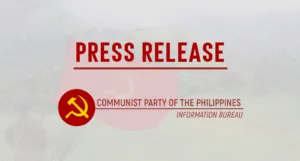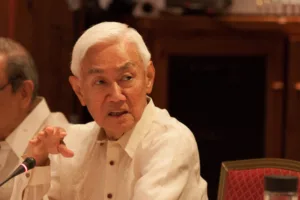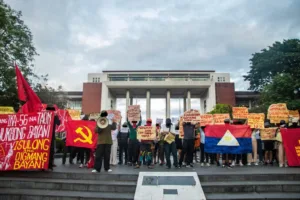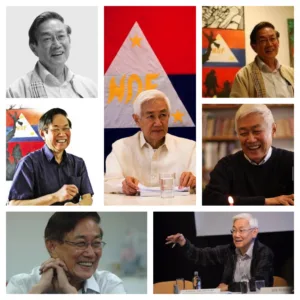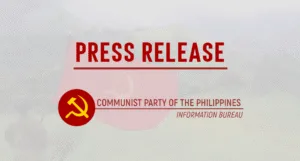By LUIS G. JALANDONI
Chairperson, NDFP Negotiating Panel
The Macapagal-Arroyo regime sent its delegation to the Netherlands not to explore ways to resume peace talks with the National Democratic Front of the Philippines (NDFP). Secretary Silvestre Afable and Atty. Silvestre Bello came to dictate the terms of surrender with a six-month ultimatum. This is a gross violation of the principle of non-capitulation stipulated in the Hague Joint Declaration signed and approved by both the Government of the Republic of the Philippines (GRP) and the NDFP in 1992.
The ultimatum, contained in the presentation of Secretary Afable, is designed to scuttle the peace talks. Not once did he mention the need to address the root causes of the armed conflict and the objective of attaining a just and lasting peace. The GRP demand is for the surrender of the revolutionary movement. The posturing of President Gloria Macapagal-Arroyo as wanting to resume negotiations when the situation becomes more conducive in the future is hypocritical. Her demand for surrender is a formula for destroying all chances for peace negotiations during the remainder of her term.
The GRP delegation tried vainly to justify the GRP's collusion in the "terrorist" listing by the US of the Communist Party of the Philippines (CPP), the New People's Army (NPA, and the NDFP's Chief Political Consultant, Prof. Jose Maria Sison. It tried to do the same for the GRP's active participation through the Ople mission in the terrorist listing of the NPA and Prof. Sison by the Council of the European Union.
The NDFP delegation, consisting of NDFP Negotiating Panel Chair Luis Jalandoni, NDFP Negotiating Panel Member Fidel Agcaoili, NDFP Negotiating Panel Senior Legal Consultant Atty. Romeo Capulong, among others, pointed out that such collusion of the GRP in the "terrorist" listing is a blatant violation of the principle of national sovereignty accepted by both Parties in The Hague Joint Declaration. This principle requires that no foreign power shall be allowed to impose its will, encroach upon, or usurp jurisdiction over the actions and internal affairs of either Party in the peace negotiations.
Therefore, the NDFP position is that the GRP must advise the US government, the Dutch government, the European Union and other foreign governments to cease and desist from listing or labeling as terrorist or imposing any penal sanction or punitive measures upon the CPP, the NPA and the NDFP Chief Political Consultant or any of the NDFP component organizations, negotiators, consultants, staffers, security and other personnel.
The "terrorist" listing of Prof. Sison is also a gross violation of the Joint Agreement on Safety and Immunity Guarantees (JASIG) signed and approved by both Parties in 1995. The JASIG stipulates that all duly accredited persons, which include the members of the peace panel of both Parties, their respective consultants, staffers, security and other personnel as well as others publicly known to be involved in the peace negotiations, have been granted safety and immunity guarantees. They may not be subjected to arrest, detention, or any other punitive actions.
The filing of murder charges against Prof. Sison by the GRP not only violates the JASIG, it also violates the doctrine of political offense laid down in the landmark case of People vs. Amado V. Hernandez and embodied in Part III, Article 6 of the Comprehensive Agreement on Respect for Human Rights and International Humanitarian Law (CARHRIHL).
Prof. Sison's fundamental right to substantive and procedural due process and to be presumed innocent until proven guilty, as enshrined in Part III, Article 2, sub-paragraph 9 of the CARHRIHL is likewise seriously violated by the "terrorist" listing.
All these gross violations of bilateral agreements by the GRP must be rectified. They are obstacles placed by the GRP. They must be removed before any resumption of formal peace negotiations in accordance with The Hague Joint Declaration and other agreements.
These violations of the GRP put the NDFP, its negotiating panel, consultants, staffers and supporters under duress. The NDFP will not negotiate under duress.
The abrupt ending of the exploratory talks on 19 February 2003 is the responsibility of the GRP delegation. The NDFP delegation offered to help resolve the issue of the violations of national sovereignty by the GRP in connection with the "terrorist" listing through a joint statement of the GRP and the NDFP, asserting the principle of national sovereignty and condemning the usurpation of jurisdiction by foreign powers over the armed conflict in the Philippines, and dealing as well with other matters. The NDFP delegation stated that in the past mutually acceptable formulations could be worked out to resolve even more difficult issues. But after requesting for a recess, the GRP delegation ended the exploratory talks.



